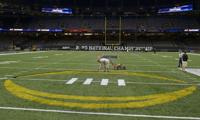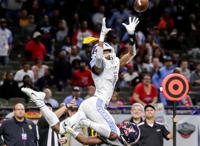In 2002, Dr. Loren Scott conducted an economic impact study on LSU football and its effects on the Louisiana economy. Scott, a professor emeritus of economics at LSU and president of his own firm, estimated fans who lived outside the Baton Rouge metro area spent about $27.4 million within the capital city during LSU’s seven home football games the previous fiscal year.
Scott repeated his study in 2013. LSU had won two national championships, played for another and developed into an annual title contender. He estimated fans who lived outside the metro area spent $47.7 million in East Baton Rouge and three surrounding parishes over a seven-game home schedule.
The study’s findings supported the dependent relationship between the LSU athletic department and the Louisiana economy, especially within Baton Rouge. The games injected millions of dollars into the metro area through fan spending and development. In total, he said, fans spent $65.7 million in the Baton Rouge metro area while attending LSU football games in 2012, an average of $8.2 million per game.
Now six years after Scott’s most recent study, LSU has completed one of the greatest seasons in college football history. It won an undefeated national championship, boosting exposure and morale. With excitement spilling into the 2020 season and two marquee home games, business owners expected a profitable fall.
“Can you imagine the excitement that this year would bring because of what we did last year?” Scott said. “The numbers are going to be much higher just in anticipation of it being a really good year.”
But the novel coronavirus pandemic has put that season in jeopardy. With almost one month until the beginning of preseason practice, positive cases have jumped across much of the country, worrying medical experts and some athletic directors.
College football leaders have not yet determined what will become of the 2020 season. They want to wait as long as possible until they announce if teams will play full schedules, begin Labor Day weekend as planned or allow fans into the stadiums. Officials intend to decide in mid-to-late July.
If the season gets altered in some way, whether LSU plays fewer games or limits attendance, parts of the Louisiana economy will suffer. The football team boosts revenue across the state, especially in Baton Rouge, while funding the LSU athletic department. It finished the 2019 fiscal year with $56.6 million in profit, the only LSU team to make more than $500,000. The majority of revenue came from ticket sales.
“As a hotelier, we definitely would like to see an LSU football season,” said Ben Blackwell, general manager of the Courtyard Marriott in downtown Baton Rouge and president of the Louisiana Hotel and Lodging Association, “but we also want it to be done safely because we want to protect the players and our guests and the university itself.”
During his 2013 study, Scott’s most conservative approach estimated fan spending at LSU football games generated $58.6 million in new sales, $18.9 million in new household earnings for Louisianans and 647 jobs.
In each of Scott’s studies, he used the ripple effect, also known as the multiplier effect, to determine the full economic value of LSU athletics. He compared it to dropping rocks in a pond. One rock represented fan spending. The other embodied athletic department expenses.
The rocks create a large splash on their own, but they also push ripples into various economic sectors. For example, Scott said, LSU employees spend their paychecks at local businesses, which creates revenue in those stores. Those employees then spend money elsewhere, and so on, until the original funds reach the edges of the economic pond.
Overall in 2013, he estimated the LSU athletic department created $397.5 million in sales, $119.7 million in household earnings and 3,948 jobs in the Baton Rouge metro area. At the same time, the athletic department’s construction projects created hundreds of millions of dollars in new sales.
The Louisiana economy also receives a bump from LSU athletics, though not one as large as Baton Rouge, according to Scott’s studies. During the 2012 fiscal year, a conservative approach estimated LSU athletics generated $331.6 million for Louisiana business, almost $66 million less than Baton Rouge. Scott attributed the difference to what economists call the “cannibalization issue.” Louisiana residents who come to games spend their money in Baton Rouge instead of another city, reducing the economic impact in other parts of the state.
Arts, entertainment and recreation businesses within the Baton Rouge economy have benefited most from LSU football, according to Scott’s study, followed by restaurants and bars. Ten other sectors, including real estate, information and health care, received boosts of more than $10 million in one season.
Hotels also benefit. Games attract hundreds of thousands of visitors, filling hotels near capacity, which increases nightly rates. Scott determined more people sat inside Tiger Stadium on a typical night in 2012 than the populations of 49 of the state’s 64 parishes.
This fall, hoteliers expected profitable quarters with home games against Texas and Alabama. The Courtyard Marriott downtown already received an uptick in reservations. Though other events create demand, Blackwell said “nothing quite compares to the LSU football season.” The hotel normally operates between 50% and 70% capacity. It fills every room during home football games. After months of decline during the pandemic, a typical season could help boost revenue.
“Football is a big part of the fall calendar,” Blackwell said. “It's something we — I wouldn't say depend on — but we definitely enjoy having in the fall. It's a revenue generator for sure.”
People will still spend money at Baton Rouge area businesses if LSU’s season changes, but the typical gameday experience may shift. Tailgates could be restricted. Restaurants and bars may not operate at full capacity, depending on when Louisiana enters the next stage of reopening.
If LSU cancels games or limits attendance, fewer fans will travel to Baton Rouge. Some fans may not come anyway because of coronavirus concerns. The ripples would dissipate. Business would lose money. By Scott’s estimates, millions of dollars.
For the original Walk-On’s Bistreaux and Bar location near Tiger Stadium, each football gameday generates more than $100,000. Those profitable weekends don’t determine the success of the business, which has locations in eight states, but this year they could help boost sales after the pandemic forced the sports bar chain to close its dining rooms.
If the season changes, COO and president Scott Taylor said Walk-On’s will provide a unique gameday experience for those unable to visit the stadiums. It will adapt to the conditions, no matter what they are.
“If they can't go watch a game, we're going to make it fun somehow,” Taylor said. “Hopefully we'll do some decent business through it.”
Taylor roots for LSU like many of Walk-On’s local customers. He wants to see a college football season — not just for the profits or earnings or dollars, but the normalcy it provides every Saturday. The sport weaves through American culture. It connects people. It feels familiar. While college football generates a financial boost, Taylor believes it may help the country heal. He wants it back for that reason as much as anything else.
“It's almost spiritual,” Taylor said. “It's not going to fix your financial situations necessarily, but it's a feeling of normalcy to see LSU take the field against Alabama or Ole Miss or Florida. You feel like things are kind of normal again. I hope they play.”
"lose" - Google News
July 06, 2020 at 07:30AM
https://ift.tt/2CaeIkE
What could Louisiana businesses lose without an LSU football season? Millions, one expert says - The Advocate
"lose" - Google News
https://ift.tt/3fa3ADu https://ift.tt/2VWImBB
Bagikan Berita Ini

















0 Response to "What could Louisiana businesses lose without an LSU football season? Millions, one expert says - The Advocate"
Post a Comment